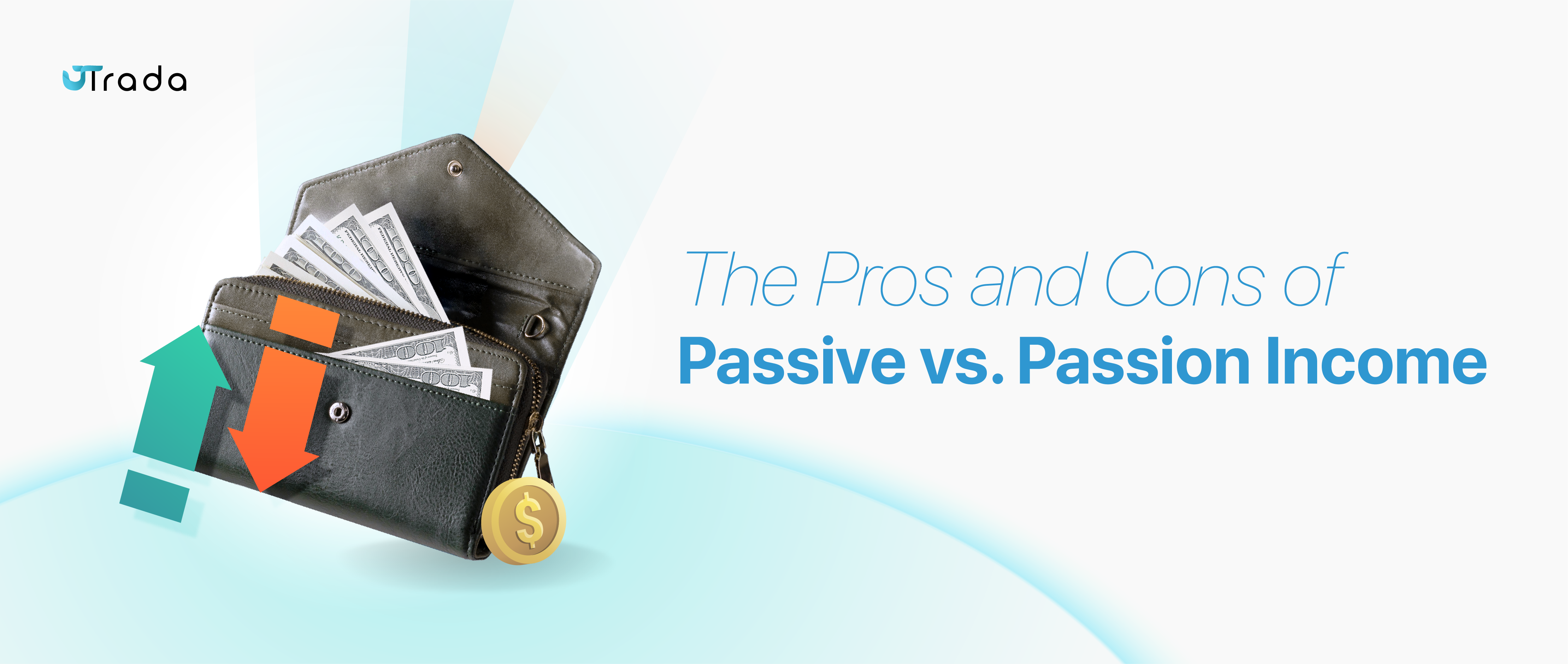In the realm of financial independence and wealth-building, understanding the different types of income streams is crucial. Two popular concepts often discussed among aspiring entrepreneurs and individuals seeking financial security are passive income and passion income. While both can significantly impact your financial health and personal satisfaction, they come from different approaches to earning money.
Passive income is earned from ventures that require minimal daily effort to maintain. The allure of passive income lies in its ability to generate earnings continuously, even when you’re not actively working. Investments, rental properties, and royalties from books or patents are classic examples of passive income sources. The main idea is to make your money work for you, freeing up your time for other activities or additional income pursuits.
Passion income, on the other hand, is derived from engaging in activities you are passionate about and turning those into a source of earnings. This could involve starting a business around a hobby, offering services in a field you’re skilled in, or creating products that reflect your interests. The key characteristic of passion income is that it’s closely tied to your personal joys and pursuits, making the work feel less like a traditional job and more like a fulfilling part of your life.
Both income streams offer unique benefits and can be pursued simultaneously or separately, depending on your goals, skills, and interests.
Table of Contents
ToggleKey Differences Between Passive Income and Passion Income

When embarking on the journey to financial freedom and personal fulfillment, understanding the distinctions between passive and passion income is crucial. While both can significantly enhance your financial portfolio, they differ fundamentally in their approach, management, and potential impact on your lifestyle.
1. Initial Effort and Ongoing Involvement
One of the most significant differences between passive and passion income lies in the amount of initial effort and ongoing involvement required. Passive income often demands a substantial upfront investment, either in the form of time, money, or both. However, once established, it requires minimal effort to maintain. Conversely, passion income typically involves continuous engagement in activities you love, which may not necessarily decrease over time.
2. Potential Financial Returns
The financial returns on passive and passion income can also vary widely. Passive income streams, such as rental properties or dividends from investments, can provide a steady, predictable income over time. On the other hand, passion income can fluctuate significantly based on how well your product or service resonates with your target market and how much effort you put into marketing and sales.
Read More: Financial Responsibility: Navigating Wealth Management
3. Risks and Challenges
Both types of income come with their own sets of risks and challenges. Passive income ventures, like any investment, carry the risk of loss. Market conditions can change, and what seemed like a surefire way to generate income can become less profitable over time. Passion income projects are also risky, as they often depend on your ability to turn a personal passion into a viable business model. Success in this area can be highly rewarding but requires navigating the uncertainties of entrepreneurship.
Understanding these key differences can help you make informed decisions about which income stream(s) to pursue, based on your risk tolerance, financial goals, and personal interests.
Pros and Cons of Passive Income
Exploring the world of passive income is enticing for many, offering the allure of earning money without the constant need to work actively. However, like any financial strategy, it comes with its own set of benefits and challenges. Understanding these can help you determine if passive income is the right path for you.
Advantages of Earning Passive Income
- Financial Freedom and Flexibility: One of the most appealing aspects of passive income is the potential to achieve financial freedom. Earning money without having to trade your time directly allows for greater flexibility in how you spend your days.
- Scalability: Passive income sources can often be scaled with relatively little additional effort. For example, investing in dividend-paying stocks can yield greater returns as you reinvest dividends and grow your portfolio.
- Risk Diversification: Having multiple streams of passive income can diversify your risk. If one income stream underperforms, others may compensate, stabilizing your overall financial situation.
Disadvantages to Consider
- High Initial Investment: Creating passive income streams often requires a significant upfront investment. Whether it’s buying property, investing in the stock market, or creating digital products, there’s usually a substantial amount of money or time that needs to be invested initially.
- Unpredictability: While the goal of passive income is to generate steady returns, some sources can be unpredictable. Market fluctuations, changes in rental demand, or shifts in consumer interests can impact earnings.
- Maintenance and Management: Despite being labeled “passive,” these income streams can require ongoing maintenance and management. Real estate investments need to be maintained, and even stock portfolios require monitoring and rebalancing.
Understanding these pros and cons can help you navigate the complexities of passive income and decide if it’s the right path for you.
Pros and Cons of Passion Income

Benefits of Pursuing Your Passion
- Personal Fulfillment: Earning income from something you are passionate about can be incredibly fulfilling. It allows you to spend your time on activities you love and find meaningful, often leading to a higher level of job satisfaction and happiness.
- Greater Engagement and Motivation: When you’re passionate about your work, you’re more likely to stay motivated and engaged. This increased enthusiasm can drive innovation and creativity, potentially leading to higher earnings and business growth.
- Flexibility in Work-Life Balance: Many passion income ventures, especially those based online, offer flexibility in terms of where and when you work. This can lead to a better work-life balance, allowing you to structure your work around your life, not the other way around.
Potential Drawbacks
- Financial Uncertainty: Turning your passion into a profitable income stream can be challenging and often comes with financial uncertainty, especially in the early stages. It may take time to establish a stable income, requiring financial planning and potentially a backup source of income.
- Blurring of Personal and Professional Boundaries: When your passion becomes your income source, it can be difficult to separate personal enjoyment from work obligations. This blurring of lines can sometimes lead to burnout or a decrease in passion over time.
- Market Viability: Not all passions are easily monetizable or have a ready market. Finding the right audience and creating a product or service that meets their needs while aligning with your interests can be complex and risky.
Pursuing passion income can be highly rewarding but requires careful consideration of these pros and cons to navigate its challenges successfully.
Balancing Passive and Passion Income

Successfully integrating passive and passion income streams can lead to a robust financial portfolio and a fulfilling career. Here are strategies for achieving this balance:
1. Strategies for Combining Both Income Streams
Start with Your Passion: Begin by building an income stream around something you love. This approach ensures that you’re engaged and motivated in the early stages of income development. As your passion project grows, you can start exploring passive income options to complement your active involvement.
Reinvest Earnings into Passive Ventures: Use the income generated from your passion-based activities to invest in passive income opportunities. This strategy can help diversify your income sources and stabilize your financial situation over time.
Leverage Skills and Knowledge: Utilize the skills, knowledge, and network you develop through your passion income to identify and invest in passive income opportunities. For example, if your passion project is in the digital marketing field, you might invest in online businesses or digital products that benefit from your expertise.
2. Real-Life Success Stories
Highlighting real-life examples can inspire and provide practical insights into balancing these income streams. For instance, an entrepreneur might start a successful blog (passion income) and then invest the earnings into rental properties (passive income), gradually building a diversified income portfolio.
3. Planning Your Income Journey
Developing a plan that outlines how you’ll balance and grow both passive and passion income streams is crucial. This plan should include goals, potential income sources, investment strategies, and timelines. Regularly reviewing and adjusting your plan can help you stay on track and adapt to changes in your income streams or financial goals.
Maximizing Your Income Streams Through Diversification
Diversification is a key strategy in both financial investment and income generation. By diversifying your income streams, you not only spread risk but also increase your chances of financial stability and growth.
This section would explore how to effectively diversify your income streams, blending both passive and passion income sources. It will cover the importance of not putting all your financial eggs in one basket and how diversification can lead to a more resilient and robust financial portfolio.
Strategies will include investing in different asset classes, starting side projects related to your passions, and exploring new markets or niches that align with your interests and expertise.
Staying Motivated and Maintaining Momentum
Maintaining momentum and staying motivated can be challenging, especially when progress seems slow or obstacles appear insurmountable. This part of the article will focus on strategies for keeping your motivation high and your progress steady.
It will delve into setting realistic goals, tracking your progress, and adjusting your strategies as needed. The importance of self-care and taking breaks will also be highlighted, emphasizing that sustainable progress often requires balance and mindfulness. Tips on finding inspiration, celebrating milestones, and staying connected with your reasons for pursuing passive and passion income in the first place will round out this section.
Navigating Challenges and Setbacks
Embarking on the journey to generate passive and passion income is both thrilling and challenging. It’s important to recognize that setbacks and obstacles are part of the process. Whether you’re facing difficulties in finding the right passive investment opportunities or turning your passion into a profitable venture, resilience and adaptability are key.
Embrace these challenges as opportunities for growth and learning. Engage with a community of like-minded individuals who can offer support, advice, and insights. Continuously educate yourself on financial strategies, market trends, and personal development to enhance your income-generating endeavors.
Read Next: 7 Best Investments Other Than Stocks
Remember, every successful entrepreneur and investor has faced hurdles along their journey. Your ability to persevere and maintain a positive outlook can transform these obstacles into stepping stones towards achieving your financial and personal goals.
Navigating the complexities of passive and passion income streams with determination and an open mind will pave the way for a rewarding and prosperous future.
Conclusion
This article has explored the contrasting yet complementary concepts of passive and passion income. We’ve delved into the definitions, key differences, and the pros and cons of each income stream. Passive income offers financial freedom through minimal ongoing effort, while passion income derives from engaging deeply in activities that fulfill you personally. Balancing these income streams can provide not only financial security but also personal satisfaction and a sense of achievement.
Embarking on the journey to develop both passive and passion income streams can be both exciting and daunting. However, the benefits of diversifying your income are clear. Not only can it lead to greater financial stability, but it also allows for personal growth and the pursuit of passions. Whether you start with a passion project and reinvest earnings into passive income ventures or vice versa, the key is to begin.
Remember, success in balancing passive and passion income doesn’t happen overnight. It requires planning, persistence, and a willingness to learn and adapt. But with the right approach, you can create a fulfilling career that aligns with your financial goals and personal interests. Start small, stay committed, and let your curiosity and passion guide you toward a prosperous and rewarding future.
Disclaimer: The information provided by Utrada in this article is intended for general informational purposes and does not reflect the company’s opinion. It is not intended as investment advice or recommendations. Readers are strongly advised to conduct their own thorough research and consult with a qualified financial advisor before making any financial decisions.
Carina Caringal is an experienced writer and analyst in the Crypto and Blockchain world, with four years of expertise. She simplifies the complex world of Digital Currencies for her readers, offering clear insights and updates on the latest trends and technologies.


